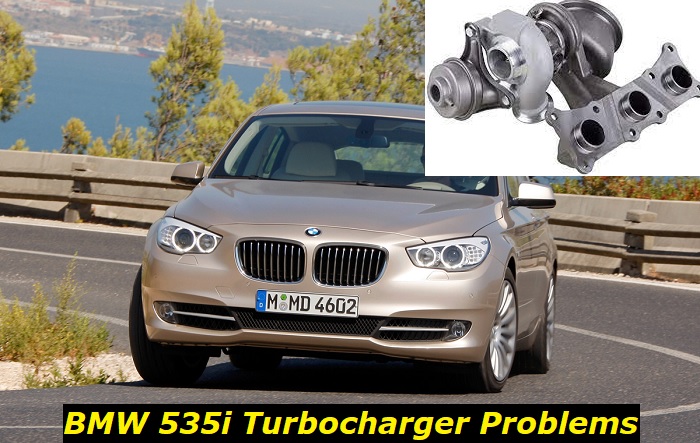The BMW 535i is a puissant mid-sized executive sedan. The magnificent four-wheeler beautifully blends speed, performance, and elegance to fashion a voguish sedan. It comes with a turbocharged engine that makes the sedan a track-worthy automobile. The twin-turbo improves the car's performance and overall efficiency.
Besides its stylish appearance, the sporty automobile produces sporty notes thanks to its turbocharged engine. Also, the twin-turbo allows the driver to communicate intimately with the car's engine.

Does the car's twin-turbo demonstrate any issues with all the power and elegance? Are these issues expensive for a BMW owner? Well, the article will talk about BMW 535i turbo issues exhaustively.
BMW 535i Twin Turbo
One of the most incredible features of the BMW 535i is its turbocharger. A turbocharged engine is quite different from a standard or a naturally-aspirated engine. The standard engine primarily relies on natural air pressure, while a turbocharged engine uses exhaust gases to generate extra horsepower. Therefore, a turbocharged engine generates power more economically than a standard or naturally-aspirated engine.
The BMW 353i has twin turbochargers that give the engine extra power when put side to side with a single turbo engine. The BMW 535i's turbo twins use TwinPower turbo tech to spin and generate power. They work together to improve the engine's power, performance, and fuel efficiency.
The exhaust gases move to and from the two turbos before getting into the engine's cylinders. The gases will then spin the turbine that's connected to the compressor. The turbine, in turn, rotates the compressor. The movement compresses air resulting in massive pressure. On the other hand, the pressure causes powerful combustion strokes. Hence, producing more power than a naturally-aspirated engine.
The twin turbos minimize the impact of turbo lag because of the two entry points. The entry points allow the turbochargers to operate under high and low flow rates. The difference in flow rate minimizes the time the turbocharger takes to actuate the throttle. Hence the minimized turbo lag leads to efficient power delivery.
The two inlets also reduce reversion by giving the exhaust gases enough room to flow into turbochargers. Therefore, creating a smoother flow and minimizing reversion. As more exhaust gas gets into the turbocharger, the turbine rotates faster. Therefore, creating extra pressure in the engine.
BMW 535i Twin Turbo Problems
Although the BMW 535i twin turbo is very efficient and makes the 535i engine one of the best BMW engines, it presents some problems.
It's common to see the following faults in BMW 535i twin turbos:
- Oil leaks
- Foreign deposits in the compressor housing.
- Boost leaks
- Vacuum leaks
- Blocked air filters
- Cracked casing and hoses.
- Damaged seals
The twin-turbo problems often manifest as;
Oil-Related Failures
Most BMW 535i twin turbos often exhibit oil-related failures. The oil-related problems could be a result of dirty oil or oil starvation due to unnoticed leaking or blocked seals.
- Oil Contamination
When the turbo fails, broken pieces may drop into the oil seals, resulting in blocked pipes or damaged oil filters. The blockage or damage often leads to oil contamination.
Apart from the broken pieces from your twin turbo, the engine oil may bring contaminants to the turbo's bearing system. The adulterant will cause damage to the turbocharger.
Also, fine particles from the combustion process can cause oil-related failures in the BMW 535i twin turbo. When the particle concentration rises in the engine, it may cause continuous erosion of the bearing and shaft. Consequently, the disintegration may result in closed oil feed or blocked oil seals leading to turbo failure. The concentration can also cause contamination of any new oil you inject into the turbo.
- Oil Starvation
Oil leaks may cause oil starvation. The leaks often emerge from a damaged intake pipe, air leak, an intercooler leak, or a blocked air filter, particularly on the intake side. The oil leaks could also come from the turbine's end because of a leaking EGR or exhaust system.
The leaks may cause low oil levels, restricted flow due to damaged pipes, and carbon build-up. It can also cause inadequate exhaust pressure. Consequently, causing oil leaks. The unnoticed oil leaks also cause turbo failures in BMW 535i. The blocked oil seals can also interfere with airflow in your turbocharger leading to excessive temperature in the turbo.
The leaks may result in oil starved bearing or shaft. If ignored, the leaks may cause severe damage to the BMW 535i turbocharger.
Sudden Power Loss
Manufacturers or car owners often put turbos in the engine to allow the vehicle to gain extra power. It means manufacturers can create small engines with additional horsepower because of turbos. Likewise, the BMW 535i engine is small but houses power.
However, most BMW 535i turbos experience a sudden power loss. The power loss may be due to low boost pressure caused by oil starvation, air leak, or an obstructed turbine. The reduced boost pressure, in turn, results in a vehicle with a poor acceleration response. You'll notice that the car cannot achieve the maximum speed it could initially achieve.
A Loud Engine
BMW is known to create twin turbos that cause a powerful yet quiet engine. You may hear desirable sporty tones.
Sadly, the BMW 535i may develop an unexpected humming engine. Your engine may produce sudden loud noises like unpleasant drilling noises. The drilling may get louder and louder without showing any signs of calming down. The unpleasant drilling sounds could be due to a damaged compressor wheel inside the turbocharger.
If you dig further, you'll notice that the loud noises arise due to air or boost leaks in the turbo, a vacuum leak in the turbocharger, over-boosting, or splitting hoses.
Discolored Exhaust Gases
The oil leaks in the turbocharger often manifest as bluish or greyish smoke as the air-fuel mixture burns.
Check whether the turbo has cracks on the seal or casing when you see discolored exhaust gases. Also, the discolored fumes may increase during or after idling.
The discolored fumes could also be due to a boost leak from your turbocharger. The boost leak may cause air to escape before going through the combustion process.
Wastegate Failure
The wastegate directs the discharge of exhaust gases away from the automobile's turbochargers. It controls the speed at which the turbo spins. It also controls boost pressure generated by your vehicle's turbocharger. Doing this will protect the engine and the twin turbos.
Over time the pressure emanating from the turbos will strain the turbocharger. The extra pressure will increase wastegate failure.
Failing Boost and Charge Pipes
Many BMW 535i turbochargers often experience breaking boost or hose pipes. The breaking occurs on the inlet side due to oil particles. The more the oil particles get into the boost or hose pipes, the more they soften, eventually causing the inlet to slip off. Hence, damaging the pipes.
Once damaged, your engine may undergo horsepower loss due to a boost pressure leak.
Are Turbo Problems Expensive for BMW Owners?
Turbocharged automobiles often break down and will require costly repairs. Stock BMW turbos may last 37,000 miles before exhibiting issues. However, your turbocharger may develop oil-related problems before hitting 37,000 miles.
All the BMW 535i turbo problems listed above cause crippling damage to the twin turbos and engine. Fixing these damages may be costly for BMW owners. Besides, BMW recommends changing your turbocharger once you reach the 100,000+ miles mark.
A kit can cost a BMW owner up to $5,000 to repair or get new turbochargers. You may spend up to $1,500 upwards of labor to install new twin turbos in your BMW 535i.
A simple oil line replacement can cost a BMW owner anywhere between $260 to $310. The parts may cost you up to $115, while labor may cost $195.
Oil leaks on the turbocharger can cost $400- $720. Replacing the charge pipe on your turbo can cost up to $250. You can do it as a DIY job. But BMW recommends taking your car to an auto shop for any turbo repairs or replacement jobs.
Can You Drive a BMW 535i with a Damaged Turbo?
A BMW 535i can run without a twin-turbo. The twin-turbo is just a feature devised to boost the pressure in your engine. Hence, giving your extra power efficiently. Your engine will not have to burn more fuel-air mixture to get more horsepower.
Sadly, the turbochargers may fail unexpectedly. It may experience an air or boost leak. The leaks may consequently lead to sudden power loss. Thankfully, your automobile can still run even after your turbo loses power or experiences catastrophic damage. But it will perform poorly and may have severe reverberation on your engine.
For instance, your engine may ingest tiny pieces from your turbocharger in case of a blow. Therefore, it's advisable to repair if you notice any signs of turbo failure as you drive your car.
Summary
Turbochargers boost your engine's power generation capacity. It does this by increasing pressure by using the exhaust gases to spin and compress or pump more air into the engine's cylinders. The compression will allow your motor to burn more air-fuel mixture per second. Hence, producing more power.
However, due to the pressure involved, your turbocharger may experience failures. In turn, the breakdown may cause serious damage to your turbo. The damage can also extend to your engine. Therefore, take your BMW 535i to the repair shop when you notice symptoms of a failing turbocharger.
About the authors
The CarAraC research team is composed of seasoned auto mechanics and automotive industry professionals, including individuals with advanced degrees and certifications in their field. Our team members boast prestigious credentials, reflecting their extensive knowledge and skills. These qualifications include: IMI: Institute of the Motor Industry, ASE-Certified Master Automobile Technicians; Coventry University, Graduate of MA in Automotive Journalism; Politecnico di Torino, Italy, MS Automotive Engineering; Ss. Cyril and Methodius University in Skopje, Mechanical University in Skopje; TOC Automotive College; DHA Suffa University, Department of Mechanical Engineering






Add comment